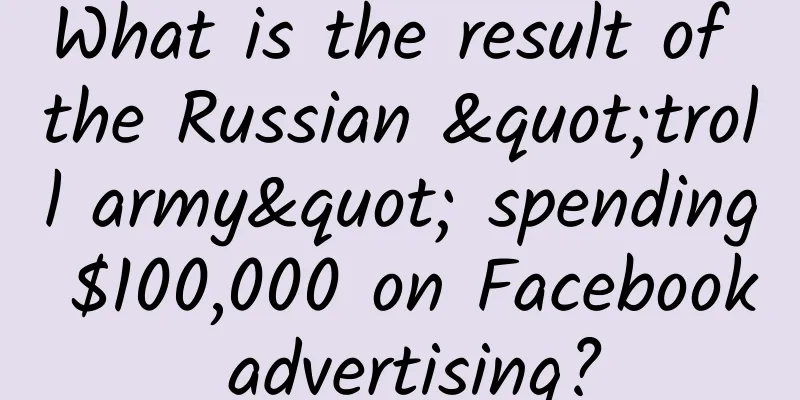What is the result of the Russian "troll army" spending $100,000 on Facebook advertising?

|
On September 20, local time, Facebook Chief Security Officer Alex Stamos revealed to the media that during the 2016 US election, Russia "probably" used 470 fake accounts to buy political ads worth $100,000. This is the first time Facebook has publicly admitted that Russia used the company's platform to try to influence the US election. Just one day later, CEO Zuckerberg announced that Facebook would submit to Congress more than 3,000 advertisements purchased by all Russian-related accounts during last year's election, and promised to promote the formulation of new advertising policies to make political advertising on the platform more "transparent." So what exactly are the ads placed by these Russian Facebook accounts? Will they have an impact on the American public? And how big of an impact will it have? Earlier this month, Facebook hinted at the content of some of the ads in a blog post. The article said that the ads posted by Russian-related accounts involved many social and political issues in the United States, including LGBT rights, race, immigration, and gun rights. At the same time, the article said that these contents seemed to be intended to widen the social divisions in the United States at the ideological level. The Washington Post confirmed the blog post's statement that more than 3,000 ads submitted by Facebook to Congress showed that the positions presented by these accounts on issues such as Islam, LGBT rights, and immigration were mostly divisive, and the advertising information they placed often provided two diametrically opposed sides on an issue. Therefore, by presenting divisive advertising content, these accounts attempted to create tension during the US election. House Intelligence Committee leader Adam Schiff, a Democrat, said he did not believe the ads were intended to drive angry voters to the polls, but rather to "suppress" them by creating divisive information and reducing their enthusiasm for participation. The Atlantic published a commentary saying that judging from the amount of money invested in advertising by Russian accounts, $100,000 is really not worth mentioning compared to the "money-burning" activities of candidates from all parties and their backers during the election. According to statistics, between 2015 and 2016, candidates from all parties invested more than $10 million in advertising on Facebook, while Trump's team directly invested about $260,000 in advertising on Facebook. If Russia really wants to interfere in the US election, is $100,000 in advertising fees "too insincere"? The article analyzes the following possibilities: 1. Facebook has not found all the ads purchased by Russian accounts. The more than 3,000 ads submitted so far are only a small part. The $21,000 ad was simply for the purpose of publishing fake news. 3. The more than 3,000 known posts are part of the "content testing" conducted by the Russian accounts. These samples will provide a reference for them to gain more coverage of users in the future. 4. After spending $100,000, the Russian side found that the effect was not good, so it suspended investment. 5. Spending $100,000 on Facebook ads just to embarrass Facebook as a company. Regarding the first possibility, congressional investigators made a similar judgment in an interview with The Washington Post, saying that the more than 3,000 ads submitted by Facebook were likely just the "tip of the iceberg." The article believes that Russia is likely just trying to use this part of the ads for "text testing." By placing them on a small scale, it tests whether the ad content is in line with user interests, analyzes data such as sharing, likes, and comments, and analyzes what content users actually like, thereby providing a reference for subsequent placement strategies. It is not impossible that Russia wanted to embarrass Facebook. Before using the account to place advertisements, Russia must have anticipated that once the truth came out, the US Congress would definitely find trouble with Facebook. The $100,000 advertisement can have a certain impact on the US election and embarrass the US technology giant, which is really a good deal. However, The Daily Beast believes that although the advertising amount is only $100,000, the coverage of the ads placed by the Russian account is far beyond the imagination of critics. According to a digital advertising expert's estimate based on the advertising strategy of the Russian account on Facebook, this $100,000 investment can cover approximately 23 million to 70 million users. It is reported that the average price per thousand ad impressions on the Facebook platform is $6. Based on this estimate, Russia can get about 16.7 million impressions with $100,000. However, this average price actually hides many complex algorithms, and the actual cost per thousand impressions may fluctuate between $1 and $100. For incentive purposes, Facebook will set prices based on the popularity of posts (including forwarding, likes, and comments). The higher the popularity, the lower the fee. In addition, ads that can direct users to posts on Facebook also enjoy additional price discounts. Therefore, the more accurate the advertising, the higher the cost-effectiveness. As a winner of Toutiao's Qingyun Plan and Baijiahao's Bai+ Plan, the 2019 Baidu Digital Author of the Year, the Baijiahao's Most Popular Author in the Technology Field, the 2019 Sogou Technology and Culture Author, and the 2021 Baijiahao Quarterly Influential Creator, he has won many awards, including the 2013 Sohu Best Industry Media Person, the 2015 China New Media Entrepreneurship Competition Beijing Third Place, the 2015 Guangmang Experience Award, the 2015 China New Media Entrepreneurship Competition Finals Third Place, and the 2018 Baidu Dynamic Annual Powerful Celebrity. |
Recommend
Foxconn will build cars for Fisker, with mass production in 2023 and an annual production capacity of 250,000 vehicles
Recently, Foxconn and Fisker jointly announced th...
ReactiveCocoa is so useful that I can’t stop using it
[[145435]] Foreplay I personally highly recommend...
Baidu Ai Procurement operation skills, how to operate Baidu Ai Procurement?
What is Baidu's most popular promotional prod...
From three aspects, summarize the interactive details of Figma that are worth learning from!
introduction Figma has been a very popular tool i...
5 types of pain may be signs of osteoporosis, but unfortunately many people don’t know about it and miss the best time for treatment!
As the global population ages, osteoporosis has b...
How to analyze and evaluate the value of KOL investment?
Social network analysis (SNA) is a methodological...
Xiaohongshu’s promotion strategies and methods!
Speaking of Xiaohongshu, what is the first thing ...
The mystery of the famous supernova explosion: Astronomers finally see the true face of the mysterious celestial body 170,000 light-years away
The evolution and fate of stars are closely relat...
APP promotion: How to choose the correct promotion channel!
In 2019, all network marketers are facing the fol...
The longer the time, the better the effect? Don’t wear steam eye masks blindly!
Reviewer: Liu Dongbao Chief Physician of Ophthalm...
I will teach you the principle of "Water Splash Disappearance Technique". It depends on you how much you can understand.
Audit expert: Luo Huiqian Researcher at the Insti...
The latest guide to APP listing in 2021
After the APP is developed, the final operation i...
Be careful! Overtime work in your twenties and thirties can still hurt you when you’re 50!
Overtime work is a problem that modern people do ...
After the failure of Fire Phone, Amazon's hardware team Lab126 began to turmoil
[[125861]] The recent months have been turbulent ...
Samsung S6 and S6 Edge: 10 features that surpass Apple
You have to admit: the new iPhone 6/iPhone 6 Plus...









